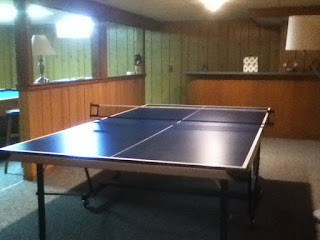I don't recall who suggested ping pong that day. We hadn't done it for a long time, for weeks. But there we were, across the table, face to face, extending our right arms holding our paddles. Our racquets were different. His resembled a worn out tree branch, one which had annihilated me with spinning shots countless times before. It was red and brown with some black dots scattered about. It looked sturdy, to be sure, though not so sturdy as it had in past years. I expect that back in his
youth it had looked even sturdier. In high school he had played ping pong and had been labeled as "best ping pong player" of the senior class. Between work hours he had worked on ping pong techniques and on ping pong drills. I admired him for that. I had begun to play in 8th grade and that accounted for some small wear and tear along the paddle, but it did not seem to be enough experience. The paddle I extended was relatively new and unused. Even so, he insisted that he would lose the match, that he was certain I'd win. I had to ignore this, however, because it was something he always said, whether or not he believed it himself.
Our warm hands shook once, much the same way we had high-fived the day after I aced my test. Fingers twisted and wrapped about the handle once again, testing for a better grip. Feet slid up and down making their little indentations on the flat carpet. My eyes narrowed in concentration as I tried to focus as much as possible on his position of the paddle and ball. Ping pong, I knew, was a competition that depended less on big movements than on one's reflexes and experience. I shifted my gaze toward his eyes and was ready. He looked back, smiled at me, and said softly (did he sound anxious?), "You say go."
It was not a long match; we only played up to 11 points. I had expected him to be more accurate, more agile. I was conditioned to lose and would have accepted defeat easily. However, after a few rallies, the ball yielded to my efforts and began to pass by his paddle a millisecond before it got there. I worked against the ball with all the strength I could find. He was working hard as well, sweating, breathing strained. It seemed that this time was different, that I was going to win. Then something occurred to me, something unexpected. I discovered that I was feeling sorry for my father. I wanted to win but I did not want to see him lose.

You did a very nice job of mimicking Manning's style and I loved how you added your own twist on the story with your very own example.
ReplyDelete